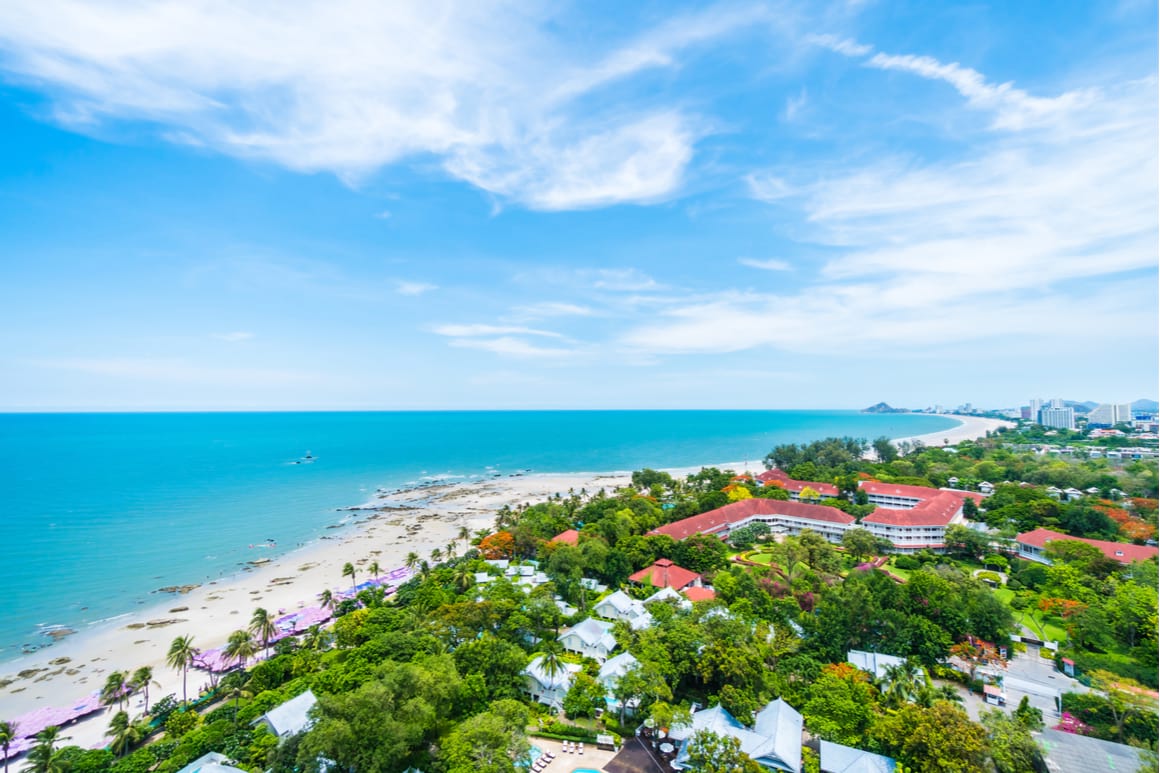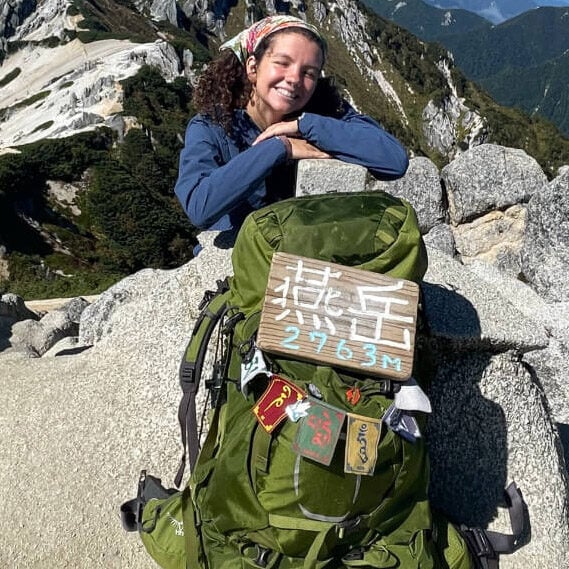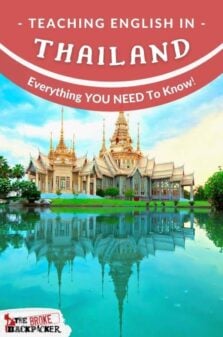Thailand has become one of the most popular destinations for teaching English abroad, and anyone you ask about teaching in the “Land of Smiles” absolutely RAVE about it.
While Thailand is known to many backpackers and travellers alike for being a country full of friendly locals, delicious food, and breathtaking landscapes, there is also a large and ever-growing market for ESL teachers.
Sadly, unlike other Asian countries such as Japan or South Korea, you won’t be living it up on a super high salary, but the low cost of living and somewhat lax requirements (more on that later) make teaching English in Thailand a great place to begin your teaching career.
If you’re interested in teaching English in Thailand, this guide will tell you everything you need to know about what it’s like and what you need to do to secure a teaching job.

Unlock Our GREATEST Travel Secrets!
Sign up for our newsletter and get the best travel tips delivered right to your inbox.
Why Teach English in Thailand?
Thailand is the perfect place to prolong your backpacker life (hello gap year life) and to get some first-time teaching experience under your belt.
Although you probably won’t be living a champagne and caviar lifestyle on your salary, it is possible to save, plus, with Thailand’s central location in SE Asia, it’s really the ideal travel job.

Before I go into the nitty-gritty, here are some pros and cons of teaching English in Thailand.
Pros | Why you NEED to Teach in Thailand
- No Degree Needed: While having a bachelor’s degree is becoming more and more essential these days, and many agencies and schools require you to have one, teaching English in Thailand is possible without a degree. Just be prepared to look a lot harder!
- Low Cost of Living: One of the huge draws of Thailand is that the cost of living there is seriously low compared to western countries. Although it varies from city to city, in most places, especially rural ones, your money will take you a long way.
- Range of Teaching Jobs: There are a huge range of teaching jobs in Thailand, from public schools to private tutoring, corporate training centers to international schools, and more, so whatever your experience level, whether you want to teach kids or adults, or want to work in the city or countryside, there’s a job for you!
- Perks: Many placements offer additional benefits that can make your employment a lot more attractive (and help you take your money further!), these can include free accommodation, lunch on workdays, and possibly even use of a motorbike while you’re working there! (YAAAS)
- Agencies: If you’re not the DIY type or are a bit nervous about moving to another country and setting everything up, there are a tonne of agencies that partner up with schools to recruit foreigners to teach English.
- Incredible Culture: Thailand is a wonderful country full of culture, beauty, and history. There are plenty of temples, monuments, and (win-win) national holidays and celebrations. Everyone needs to experience Son-kran (the Thai Buddhist new year celebration) at least once in their life.
Cons | What to Consider before Teaching in Thailand
- Language Barrier: In rural areas, many people don’t speak English, so having some Thai in your vocabulary is essential.
- Low Salary: While the cost of living in Thailand is low, and granted, some teaching jobs pay extremely well, most of the time your salary might be on the lower end of the spectrum. This is especially true in more rural areas, but the lower cost of living there should balance it out!
- Hidden Agency Fees: While agencies are a fantastic resource, sometimes you need to check the fine print on any additional fees they might charge you. This includes fees for sorting out your visa and helping to set you up in your accommodation, as well as any monthly fees. Some agencies can also have a bad reputation, so make sure to check out reviews from other teachers and do some additional research to save yourself a potential nightmare later on.
How Much can Teachers Expect to Make?
The HUGE range of teaching jobs in Thailand means that your salary could vary but on average, most jobs will pay you around 800 -1,500 USD (26,700 – 50,000 THB) per month. You can expect public schools to pay the least and international schools/university teaching to pay the most (no surprises there).
Your options on where to teach English in Thailand are public schools, international schools, corporate training centers, bilingual/”demonstration schools”, private tutoring, and teaching at a university.
Public schools are by far the most plentiful in the country and can be found in buzzing cities and urban areas like Bangkok, Chiang Mai, and Phuket, as well as in more rural areas. For aspiring teachers without a degree, looking at public schools in the countryside or “the provinces” may be your best bet for finding a job. The salary for public schools is usually between 1,000 – 1,200 USD per month.
International schools pay between 2,500 – 3,500 USD per month. There are plenty of international schools in Thailand that use a foreign curriculum, have a mostly foreign staff, and have all-English instruction. The requirements to get these kinds of positions are a lot stricter and you will most likely need to have teaching experience and be a licensed teacher in your home country.
Teaching English at a university is possible at some institutions with as little as a bachelor’s degree and a TEFL certification, although some teaching experience will always help! Thailand has both public and private universities, with public universities paying towards the lower end of the spectrum. A teaching position at a university can give you between 1,200 – 4,000 USD a month.
Bilingual or “demonstration schools” fall somewhere between public and international schools. English teaching jobs here pay between 1,500 and 2,000 USD. These institutions teach using the Thai national curriculum and use a mixture of local and foreign teachers speaking in Thai or a secondary language (usually English).
Corporate training centers pay higher than the average ESL jobs at 1,600 – 2,500 USD a month. This higher salary usually comes with the stricter requirements of a university degree, TEFL certification, a business teaching certificate or business experience, and teaching experience with adults. Training centers usually follow their own business-orientated curriculum and tend to be more demanding work-wise.
There are also private tutoring jobs in Thailand usually catering to wealthy individuals who pay on average 2,000 USD a month. This kind of job is harder to come by and normally requires some sort of social “in” or network to find. Bear in mind that private tutoring on top of your normal job is illegal in Thailand, and to become a full-time or part-time tutor legally, your employer will need to arrange your work visa.

Requirements for Teaching in Thailand
Here are the requirements and some extra things you will need to consider before heading out to teach English in Thailand:
- Fluent English Speaker: this status comes from holding a passport from the U.S., U.K., Ireland, Canada, Australia, New Zealand, or South Africa OR through proving fluency by scoring 600+ on the Test of English for International Communication (TOEIC) or a 5.5+ score on the International English Language Testing System (IELTS). These tests can be taken before you arrive in Thailand or be taken in Bangkok.
- A Non-Immigrant B Visa: you should apply for this before entering Thailand. You can double check with your embassy or local consulate about any additional paperwork, but generally you will need to provide your passport with at least 6 months validity left and two blank pages, passport photos, an original copy of your bachelor’s degree (you can still get a non-immigrant B visa without a degree if your school is willing to “push” for you to get one but this won’t be the case for every school), a certified criminal background check, visa application fee, and documents provided by the school employing you.
- Work Permit: Once you’re in the country you’ll need to apply for a work permit. For your work permit you will need your passport with your non-immigrant B visa, passport photos, original copy of your degree (see above), a valid medical certificate from a local Thai doctor, and any evidence of previous teaching experience if you have any.
- Teaching License: After you’ve got your work permit (this is the last of the paperwork, I promise!) you’ll need to apply for your teaching license. Unless you have a degree in education, you will need to apply for a temporary teaching license (valid for 6 years). This will require your passport with your non-immigrant B visa, your work permit, passport photos, if applicable an original copy of your degree and any relevant university transcripts, and a certified criminal background check.
- Start Up Money: Even though you’ve landed yourself a job, there are still up front costs for moving, plus living before your first paycheck. You should budget at least 4,500 USD (150,000 THB). This will cover the cost of your apartment (some places will ask for a one or two month deposit), transport and food until you get paid, your airline ticket, and visa fees. This may seem like a lot, but it’s better to over budget than under budget, am I right?
If all that seems daunting to you, you can let someone else do the work for you! Global Work and Travel offers fully guided programs for travellers that want to combine their passions of teaching and travel into one with TEFL placement and assistance finding paid work included.
Where to Get TEFL Certified
Up until this point, I haven’t really been talking a lot about getting a CELTA or TEFL qualification. While this isn’t a requirement for getting a teaching job in Thailand, it is definitely a good idea to get one of these under your belt as it will give you the upper hand on other candidates and prepare you for teaching! If you are going to try your luck at getting a teaching job without a degree, having a TEFL or CELTA is a must.
They will make teaching English abroad a lot easier as they are both internationally recognized qualifications and a standard for many countries. I highly recommend investing in getting one if you plan to make a career in teaching English!
Online TEFL Certificates
There are tons of places to get TEFL certificates online. Some of them are phoney. These are usually video-only courses where you don’t talk to someone or lesson prep on your own and they won’t help you teach English on the ground.
Whatever you do, do NOT buy a TEFL certification without having completed a course. These companies are well-known by employers and you will not only damage your reputation but may end up blacklisted from many teaching jobs in Thailand.
Aside from that, you will go into the classroom with no skills and have no idea what to do. Teaching ESL is not just about being able to travel the world, it’s the livelihoods of others, so it’s best to invest in a TEFL course if you’re serious about teaching.
Here are some of our faves:
myTEFL
The MyTEFL 140-hour course is the gold standard of TEFL certificates. It is accepted by any country and prepares you for a career of teaching abroad. This is an ideal course for those wanting to teach English online as it comes with an additional 20 hours dedicated to purely online teaching.
The 140-hour course covers all the areas of the English language you’ll be expected to teach such as reading, speaking, listening, writing, and phonics, as well as going into the fundamental skills you need to be an English teacher.
They also have a jobs board, so you can search for ESL teaching jobs anywhere in the world.
They also offer a 120-hour course for those that don’t think teaching English online is for you.

Let’s TEFL
Let’s TEFL is the next best online TEFL certificate, and is the best for those needing a refresh of English rules themselves before hitting the classroom. If it’s been a long time since you’ve studied English at school, this course will help you brush up on your grammar and language skills.
It also covers classroom management and lesson planning, so you’ll be fully prepared to teach abroad and start your hunt for TEFL jobs.
It is a 120-hour course that will have you ready and raring to share some knowledge!
TEFL Pros
TEFL Pros isn’t the most hands-on certificate, but their course is usually the cheapest. Plus, they’ve got a free trial so you don’t need to drop money to see what this is all about!
TEFL Pros also offer a 120-hour course that covers the fundamentals of the English language and classroom management techniques. However, it is solely online. This is great for people who are already traveling, but if you want to gain in-classroom experience then this course isn’t for you. However, it will suffice to land you a job teaching English in Thailand.
Getting your TEFL in Thailand
Online courses are great, but some of you might prefer in-person, hands-on training. Lucky for you, there are some amazing courses in various locations across Thailand. These of course are pricier than online courses, but offer a unique experience and are a wonderful introduction to teaching.
SEE TEFL
SEE TEFL offers a 4-week in-person TEFL course in Chiang Mai. The course runs from Monday to Friday 9AM – 4PM, giving you plenty of time during the weekends to explore all that the city has to offer (Chiang Mai is AWESOME btw). The classes are small, with a maximum of 20 trainees, so you’ll have enough one on one time with the teacher if you need, but also be able to make some cool new friends too! The price starts at 1,395 USD including all fees, books, certification, etc., and if you wanna arrange somewhere to stay through them it’s 350 USD for single occupancy and 400 USD for double occupancy.
International House Bangkok
International House Bangkok is a great place to get your CELTA qualification in Thailand. They offer 4-week in-person courses in Bangkok and Koh Samui (learning to be a teacher on a paradise island??? Sign me up now please), as well as at their sister centre in Chiang Mai. What’s so great about International House Bangkok is they offer a full-board package that includes accommodation for the entire duration and food on Mondays to Fridays. Prices vary depending on location, but the Bangkok course is 2,250 USD.
Where to Teach English in Thailand
Thailand is such a beautiful and varied country, that teachers looking for the big city life, the laid-back island life, or the slow-paced country life will all find what they’re looking for! Keep reading for the top places to teach English in Thailand:
Teaching in Bangkok

Bangkok is probably where most people end up teaching. It is Thailand’s bustling capital city after all, so jobs are plenty. If you’re looking to teach in an international school, then the central business district is just teeming with them. Bangkok is also where you’ll find the most corporate training centers too. Since the city is a major port of Asia, businessmen from all over take meetings here and that creates a huge market for English teachers specialising in business English.
Other than the huge availability and range of jobs, Bangkok is hugely popular to live in because not only is it a hot tourist destination (great food, incredible temples, buzzing nightlife), it is also highly connected, making it a great base for anyone who wants to explore the rest of Thailand or SE Asia!
English teaching jobs in Bangkok will most likely pay the most, BUT, this is balanced out by the higher cost of living.
Teaching in Phuket

Phuket is THE place to teach if you’re into white sand beaches, palm trees, and an insane after-hours scene (get ready to party it UP). There’s a reason why people from all over the world flock there, and that many people can’t be wrong… right?! You’ll find international schools, public schools, universities, bilingual schools, and more. The drawbacks are the high cost of living, loads of tourists = higher prices, and the crowds.
Teaching in Chiang Mai

Chiang Mai (one of my favorite places in Thailand) is also a popular place to live and teach English! This northern Thai city has a super chilled vibe, next-level food, a bit of a party scene, but a cool cultural scene too. It’s the perfect blend between old and new and is close to some of Thailand’s most popular residents, elephants!
The salary here is lower than in Bangkok and Phuket, but totally manageable with the lower cost of living. The city is quite densely populated so you’ll find a load of teaching opportunities here, although positions in universities, international schools, and corporate training centers will be a bit harder to come by.
Teaching in Rural Thailand

For you more adventurous folks out there, teaching English in rural Thailand may just be the thing for you. There is a high demand for teachers in rural areas (those without a degree who are looking for a job, this is your best bet!). Expect to be teaching in a public school with a salary on the lower end of the scale, but with a super low cost of living. The downsides of rural areas are the language barrier, and lack of things to do. If you’ve got some Thai words handy and like the slow life, then get ready for a fun time and to make loads of local friends!

We’ve tested countless backpacks over the years, but there’s one that has always been the best and remains the best buy for adventurers: the broke backpacker-approved Osprey Aether and Ariel series.
Want more deetz on why these packs are so damn perfect? Then read our comprehensive review for the inside scoop!
View on Osprey View on REILiving in Thailand and Teaching Online
Unfortunately living and teaching English online in Thailand is technically illegal without the correct visa and work permit. I’m sure there are people out there who fly under the radar and don’t get caught, but getting caught could lead to fines, deportation, or detention.

How to Find a Job in Thailand
There is a huge market for English teachers in Thailand, so finding a job shouldn’t be too difficult! There have been a lot of agencies popping up over the years, but many ESL teachers have some horror stories, so it’s always best to take some time to research thoroughly. There is also the option of finding your own job.
Go with Global Work and Travel
Global Work and Travel is an Australian based travel agency that provides guided programs for travellers wanting to combine their passion for work and exploring a new country. The packages normally come with assistance with visa requirements, connections to local businesses, accommodation search and job interviews. Some products even come with flights and basic medical insurance, a 24/7 Emergency line and payment plans.
For Thailand, you’ll start with 4 week TESOL course in Chiang Mai or Hua Hin depending on which program you choose, where you’ll also receive your certificate. Once you’ve completed the course, finding a job will be a breeze. Global Work and Travel has partnered with exclusive local schools around Costa Rica where you could be given an English teaching contract in as little as two weeks of course completion. They’ll plan and organise all the surrounding logistics, the 24/7 emergency support team is always on standby, and their in-country partner will guide you throughout the entire journey and answer all of your questions.
For Teach Camp and summer school, you’ll just have your orientation in Hua Hin without the added TESOL course. You’ll then begin your teaching adventures!
In order to qualify for these programs, you’ll need to have a Bachelor’s Degree in any field and a laptop that you can take with you.
Teachers For Thailand
Teachers for Thailand is a company with over 25 years of experience run by foreign staff. Their on-site reps assist you with finding a job, getting somewhere to stay, and getting settled in. What we love is that their reps will be there to support you throughout your entire stay so if you run into any problems they can assist you!
Finding Your Own Job
If you’re willing to do a bit of extra work and find a job yourself without the help of an agency then sites like ajarn.com and Dave’s ESL Cafe are both great websites with job listings and a load of resources. Some people recommend heading to Thailand to look for a job, the benefit of this is you can attend in-person interviews and get a feel for your employer, you can also see in person the school, the working environment, and if included in your contract, your apartment. The worst times to find a job are in December, January, and the first half of April.
Luckily, if you enter Thailand on a tourist visa, this can easily be changed into a non-immigrant B visa in the country, once you have the contract and relevant documents from your employer.

A new country, a new contract, a new piece of plastic – booooring. Instead, buy an eSIM!
An eSIM works just like an app: you buy it, you download it, and BOOM! You’re connected the minute you land. It’s that easy.
Is your phone eSIM ready? Read about how e-Sims work or click below to see one of the top eSIM providers on the market and ditch the plastic.
Grab an eSIM!Living in Thailand
Living in Thailand VS visiting Thailand is a no-brainer if you ask me! What better way to experience the culture, food, customs, hidden spots, and more, than by living in it day to day?
Safety
In general, Thailand is a safe place to live. There is a history of social unrest at times, but just keep your wits about you and be sensible. If you hear about an area where protests or demonstrations are ongoing, then steer clear, and monitor the situation from afar.
In terms of petty crime, in tourist areas, it is relatively low, but be sensible with your belongings etc. and if you plan to go out partying, always watch your drink and make sure you have a safe way to get home after.
One thing to be mindful of is that Thailand has a ruling monarchy, and they have strict laws against insulting the King. Foreigners have been jailed in the past, and although this isn’t a regular occurrence, it’s best to just keep your mouth shut regarding the monarchy!
Month to month payments, no lock-in contracts, and no itineraries required: that’s the exact kind of insurance digital nomads and long-term traveller types need. Cover yo’ pretty little self while you live the DREAM!
SafetyWing is cheap, easy, and admin-free: just sign up lickety-split so you can get back to work! Click the button below to learn more about SafetyWing’s setup or read our insider review for the full tasty scoop.
Monthly Budget
Your monthly budget will vary a lot between cities and rural areas, but your salary will reflect the higher/lower cost of living to some degree. This is the average monthly budget for Thailand (so adjust accordingly!)
| Flying to Bangkok (from the US) | $800 – $1,300 |
| Accommodation | $200 – $600 |
| Food | $350 |
| Transport | $30 – $50 |
| Entertainment | $150 |

Money-Saving Tips
How much you spend of course depends on you! The most extreme way to save money is to avoid expensive cities like Bangkok and Phuket and live and teach English in rural Thailand, but if that’s not what you wanna do here are some tips to help stretch your Thai Baht and keep you within your budget.
Accommodation: Luckily Thailand, and in Bangkok especially, you easily can find good quality and affordable condos or apartments. If you want to save on accommodation, find somewhere a little further out from the city center/downtown.
Food: There is a big street food culture in Thailand, and often, eating out is actually cheaper than eating in! If you love to cook at home, try using local ingredients purchased at your nearby market as imported goods will have a hefty price tag. Learning how to bargain is also a must.
Transport: Bangkok has a decent public transport network so definitely take advantage! If you can’t take a train or bus to your destination, songthaews are a cheap way to travel. Avoid riding in tuk-tuks in touristy areas as drivers often hike up the prices for foreigners so unless you know the real cost and have some mad bargaining skills, you might get “taken for a ride” (haha).
Entertainment: This one’s really on you. You can do some research online about some local parks or free attractions, or space out your sightseeing across a couple of months. If you want to go out drinking, local beer is cheaper than imported beer and it tastes good too!
Speaking the Language
Fortunately speaking Thai isn’t a must when you’re teaching English in Thailand. However, if you’ve decided to teach somewhere more rural, being able to speak some is really going to make things a lot easier and improve your quality of life. I would also recommend having some basic phrases learned wherever you end up teaching, as being able to say thank you in someone’s local language goes a long way.

FAQs on Teaching English in Thailand
Final Thoughts on Teaching English in Thailand
Getting yourself a teaching job in Thailand is a fantastic idea. Living and working in Thailand is an awesome adventure and you’ll experience the country in a more intimate way. Although the salary of ESL teachers isn’t that high, it is definitely enough to get by comfortably, and if you’re smart and use some simple money-saving tips you’ll still be able to save a little.
While scoring yourself a job without a university degree is becoming more and more difficult, it IS still possible if you’re willing to look really hard and are okay with somewhere a little more rural.
Basing yourself in Thailand for a year or two is a great way to travel the rest of SE Asia, and if you’re considering making teaching English abroad into a career, it is a good way to gain some teaching experience to land teaching gigs in other countries!

And for transparency’s sake, please know that some of the links in our content are affiliate links. That means that if you book your accommodation, buy your gear, or sort your insurance through our link, we earn a small commission (at no extra cost to you). That said, we only link to the gear we trust and never recommend services we don’t believe are up to scratch. Again, thank you!







